Despite a softening of the real estate market and changes in the economy, officials of Vineyard banking institutions remain generally optimistic about local affairs with few reservations.
The largest bank on Cape Cod, Sentry Federal Savings Bank, which has a branch on the Vineyard, recently announced an increase of $9.7 million in its loan loss reserves, an amount which bank president Gerald G. Shuck says represents a “realignment on the balance sheet rather than out-of-pocket losses.’’ The funds for this come out of operating earnings. The purpose of the increase is to offset bad loans and can’t be counted as capital. It is unlikely that consumers will see any changes at the bank due to this action.
Sentry reported the action came in response to a weakened real estate market. This decision to set aside additional loan loss reserves was “timely, prudent, and in the best interest of our depositors,’’ said Mr. Shuck.
Other thrift institutions serving the Vineyard report that they have no plans to increase their loan loss reserves. Richard Leonard, treasurer and chief executive officer of the Martha’s Vineyard Cooperative Bank says, “We review our loan loss reserve and adjust that as necessary on an ongoing basis, based on the structure of our loan portfolio. It is not anticipated that there will be any major change in current policy or practice due to current market situations.”
Neither Dukes County Savings Bank nor Compass Bank plan to increase their loan loss reserves. Edward Mayhew Jr., president of Dukes County Savings Bank, says, “We’ve had a good year as I’m sure the other local banks have,” he said, “because our boards are more conservative than others.”
At the Martha’s Vineyard National Bank, a commercial banking institution, vice president Kevin Griggs says there are no plans to increase the loan loss reserve. The banking business here is in much better condition than most areas of the Cape. “We remain cautiously optimistic,” Mr. Griggs says.
“I would think there will be a required increase in our reserves,” says Thelma Crawford, chief executive officer and vice president of the Edgartown National Bank, another commercial institution. The softening of the economy in the past months affects the classification of a loan, she says. If loan payments are not made on a timely basis the status of that loan deteriorates, and this affects the amount of reserve required to cover it.
Vineyard banking institutions report that real estate construction loans have dropped considerably. “We aren’t making any. We’re down 100 per cent,” says Mr. Mayhew. Edgartown National reports a decrease of 75 to 80 per cent in this category, and the Martha’s Vineyard National Bank reports real estate construction loans are “down significantly” this year as does the Martha’s Vineyard Cooperative Bank.
Mortgage loans are a mixed bag for the area. Dukes County Savings reports it has been out of the mortgage market for the last six months. “You are only allowed to loan out so much money on mortgages,” says Mr. Mayhew. When deposits increase or if the bank sells off its mortgages then the institution can increase its level of mortgage money, he says, but Dukes County keeps its mortgages in-house. “Mortgage loans are still strong, but we’re not doing the volume we did two years ago,” says Mr. Griggs at Martha’s Vineyard National. Michael Southern, loan officer for Compass Bank, reports that there has been a decrease in mortgage loans for his institution, but he says, “In terms of market share, we’re proportional to last year.”
Mrs. Crawford explains the drop in the mortgage market as a response of the policies of Alan Greenspan, chairman of the Federal Reserve Board. “Greenspan’s intent was to cut purchase of big ticket items...I think Greenspan has done an excellent job of balancing the economy for avoiding a recession and addressing possible inflation,“ she says.
Foreclosures are up and may increase in the coming year according to some local banking officials. Currently there is not much of an increase, but Mr. Mayhew expects there will be an increase in the coming year. Mrs. Crawford has been with the Edgartown National Bank for 9½ years and says, “I don’t recall having seen any foreclosures advertised before.” She sees the possibility of more taking place. Mr. Southern says that Compass Bank’s niche in the market is the primary home. “We’re fortunate in that respect. We have very good loans on the Island . People are willing to take the commitment to the bank very seriously,’’ he says.
The Martha’s Vineyard National Bank sees a slight increase in foreclosures on the Vineyard. “We’ve only had a few. Most of those kinds of property questions are worked out in a different way because property on Martha’s Vineyard is quite marketable,” says Mr. Griggs.
The present drop in real estate prices local banking officials see as a return to normalcy. “We compare the activity of ‘86 to ‘88 as abnormal,” says Mr. Griggs. “We see no problem with this return.” He says the Martha’s Vineyard National Bank divides the total number of sales into the total dollar amount of sales month by month, and while this figure may fluctuate from month to month the average over time is increasing approximately at two per cent.
Although she sees the national economy slowing down, particularly Massachusetts and the rest of the eastern seaboard, Mrs. Crawford says, “I’m optimistic as far as Martha’s Vineyard is concerned. We’re such a desirable area. I know we will rebound.”




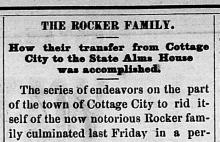
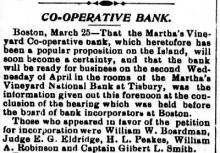
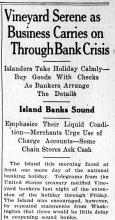
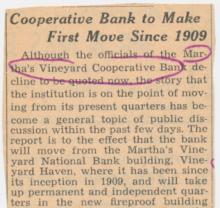
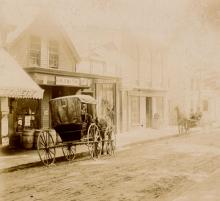
Comments